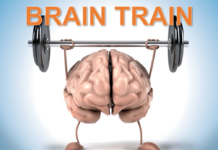The Rock always trains with music. / Instagram
The right workout music can boost your training. It can help you eke out extra reps on the bench press and step faster for longer on the StairMaster. It can make a significant difference in your motivation, endurance, and overall enjoyment. But what is the right music and how does it affect us? Let’s get into the groove as we explore the science of exercise music to help you create your ultimate workout playlist.
WORKOUT MUSIC: TEMPO
One of the key elements of effective workout music is its tempo. One study found that music with a fast tempo (ranging between 120 and 140 beats per minute) can increase arousal, enhance endurance, and synchronize movements during exercise (1). Another study explored music tempo and its effect on strength for reps. Subjects either listened to instrumental, fast-tempo music (137-160 beats per minute) during weight-training or exercised in silence. Listening to the music increased maximal power output by 12.5% over no music and the intensity one can maintain before reaching failure by a whopping 26% (2).
Most people have a preferred tempo of 120-130, which aligns with walking and applause. But you may want to crank up the rhythm for your hardest, higher rep sets, activities like sled-pushing, or the high-intensity segments of HIIT cardio. A lot of modern hip-hop (60-100 bpm, on average) is more conducive to chilling out than amping up. Rock and roll, especially metal, can be at any pace, but thrash metal comes in at 150+ beats per minute. Techno and trance average 120-140 bpm, but regularly go much faster, and speedcore is as fast as its name suggests (300-1000+ bpm). It’s a matter of personal taste, and a fast song you hate will likely only be a distraction and less effective than a slower song you love. But try adding more beats per minute to see if it helps you eke out more reps per set.
For more on music tempo and strength, check out: Music Increases Strength
WORKOUT MUSIC: PSYCHOLOGICAL AND EMOTIONAL EFFECTS
Music has the ability to evoke strong emotions and influence our mental state during our workouts. A study revealed that carefully selected motivational music can reduce perceived exertion and improve overall exercise performance (3). Research demonstrates that lyrics that convey empowering messages or inspire determination can also have a profound impact on motivation and mindset during exercise (4).

See also: The POWER of Positive Thinking
WORKOUT INSPIRATION PLAYLIST
Here’s a few diverse songs with workout-inspiring lyrics:
“Gonna Fly Now (Rocky Theme)” Bill Conti
“Harder, Better, Faster, Stronger” Daft Punk
“Remember the Name” Fort Minor
“Mama Said Knock You Out” LL Cool J
WORKOUT MUSIC AND EXERCISE PERFORMANCE
Beyond motivation and psychological effects, music has been shown to improve physical performance during exercise. A meta-analysis examined the impact of music on various exercise parameters and found that music can enhance endurance, increase energy efficiency, and elevate overall performance levels (5). Moreover, studies indicate that music can optimize movements, resulting in improved running economy and decreased perception of effort (6).
WORKOUT MUSIC AND PERSONAL PREFERENCE
While research provides general guidelines, personal preference remains crucial when selecting workout music. Each individual may have unique musical tastes and responses to different genres or artists. Experimenting with various styles and creating custom playlists tailored to specific workouts can enhance engagement and enjoyment. A study suggests that preferred music stimulates the release of dopamine, a neurotransmitter associated with pleasure and reward, resulting in increased motivation and positive feelings during exercise (7).

WORKOUT MUSIC CONCLUSION
Choosing the best workout music involves a combination of factors, including tempo, motivational lyrics, personal preference, and customization. By harnessing the power of music, individuals can elevate their mood, enhance motivation, and boost performance during exercise. Whether it’s a squat PR, high-intensity cardio session, or calming yoga practice, the right music can help make the workout experience more enjoyable and productive. Exploring different artists and genres is encouraged to find what works best for you and your training goals. Experiment with creating custom playlists to cater to specific workouts. Then, grab your earbuds or headphones and let the power of music amplify your fitness journey.
Sources
1. Karageorghis, C. I., & Terry, P. C. (1997), “The psychophysical effects of music in sport and exercise: A review,” Journal of Sport Behavior, 20(1), 54-68.
2. Centrala, J. et al. (2020), “Listening to Fast-Temp Music Delays the Onset of Neuromuscular Fatigue,” Journal of Strength and Conditioning Research 34(3):p 617-622, March 2020.
3. Hutchinson, J. C., Karageorghis, C. I., & Jones, L. (2008), “Exploring the effects of music tempo on self-paced exercise performance,” Journal of Sports Sciences, 26(12), 1387-1395.
4. Karageorghis, C. I. et. al. (2011), “Ergogenic and psychological effects of synchronous music during circuit-type exercise,” Psychology of Sport and Exercise, 12(5), 574-581.
5. Biagini, M. S., Brown, et al. (2012), “Effect of music on exercise performance,” Journal of Strength and Conditioning Research, 26(8), 1933-1940.
6. Bishop, D. T., Karageorghis, C. I., & Loizou, G. (2018), ‘”A grounded theory of music use in the psychological preparation of elite athletes,” Psychology of Sport and Exercise, 38, 148-155.
7. Särkämö, T., Tervaniemi, et al. (2013), “Music listening enhances cognitive recovery and mood after a middle cerebral artery stroke,” Brain, 136(8), 2517-2528.
See also: Top Workout Songs of 2023















































